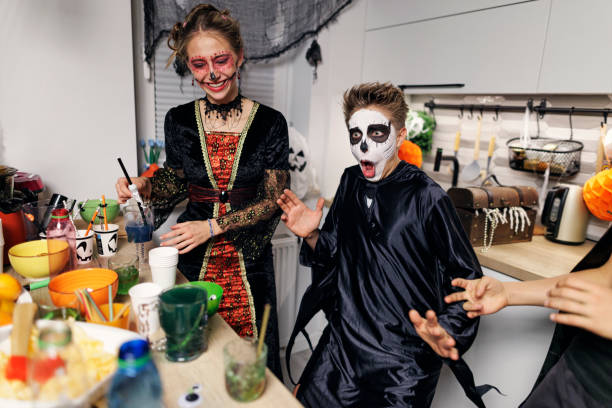
Halloween is largely viewed as a fun tradition for people of all ages. When kids celebrating this holiday are younger, they choose their costumes and head out with adults to go door-to-door collecting candy. This is a time when it is a given that there will be parental supervision and coordinating schedules around other activities (such as extracurriculars), and the parents’ schedule is part of getting ready for the day. If you’ve reached the time when your teen wants to go out for Halloween without you, you may feel at a loss about how to approach this new situation.
Your teen may be inclined to think they can just head for the door at a certain point of the day; you’re not coming along, so why would they need to talk about anything? Just because your teen isn’t in grade school anymore doesn’t mean Halloween doesn’t need some planning. With parties and vehicles on the road, it is important to talk to your teen about safety tips to enjoy their Halloween and to do so before they’re ready to go.
Things to be Aware of for Your Teen During the Halloween Season:
- Independence: This might just be the year your teen or tween would rather canvas the neighborhood without any grownups tagging along. While a scary transition for parents, it’s also an exciting time as your child learns to become more independent.
- Peer Pressure: Teens may feel pressure to participate in activities they find frightening because their friends are doing so.
- Overstimulation: The sensory overload of Halloween festivities, including loud noises and crowded parties, can be overwhelming for your teen with ADHD or Social anxiety.
- Tricks that go wrong: What if the pranks and tricks your teens get involved in are ones that cause damage or that you find inappropriate?
3 Ways to Create A Safe and Fun Halloween for Your Teen

1) Open Communication:
Create a safe space for your teen to express their likes and plans. Hopefully, you and your teen practice open communication and foster your connection year-round. Encourage them to talk about what specifically they wish to do for Halloween and why. Listen attentively. Nothing will make a teenager wall off faster than an adult who dismisses something they’re passionate about. With generational gaps, it can be easy not to be able to relate to something your teen thinks is really cool. Luckily, it is just as easy to ask a couple of curious questions about it to better understand what it is they appreciate.
Being a teenager is tricky. You are still under the supervision of lots of adults, but you are asked to take on more responsibility and be more self-sufficient. This push-and-pull can feel unfair at times when you’re being asked to show up in what feels like an adult way but still being treated as unreliable. Most teens are keen to prove that they can be trusted because most of them want to be able to go out with their friends and have some freedom. Because of this, it can be hard for them to admit their concerns. When they do share anything they might be worried about, avoid dismissing these concerns; instead, validate their feelings. “That sounds stressful; I can understand why you’re worried about it,” or, “It makes a lot of sense to me that you’re thinking about that; I would probably be concerned about the same thing if I were you.”
Don’t rush in to “solve the problem for them.” You might want to ask, “Have you thought about what you might do if that comes up?” This question gives space for your teen to say that they have and perhaps share some of their strategies with you. You can commend their troubleshooting if any one of their planned responses sounds good to you. They might also take that opportunity to include you; “Yeah, but I’m not sure which is best,” or, “I tried, but I was wondering if you had any ideas.” When helping them come up with a plan, keep in mind that you’re helping them do it. Review what they expressed. “It sounds to me like the most important thing to you is…” If they confirm that you’re understanding them, go from there. “If that’s what’s most important to you, then how do you think you can make sure it happens?”
Make sure that if your teen has a cell phone, it is fully charged when they leave for the night. Let them know that you will come get them if they need you to. You will have your phone on, and you will be available to text or answer the phone if they need. Social situations can be stressful, more stressful than your teen might want to admit to you. Having an out if their anxiety gets too high or they become fatigued in the evening will liberate them.
Having a good rapport and dialogue will also come in handy when your teen comes home. You will likely want to hear about the best part of the night, anything really interesting they did or witnessed, who they had the most fun with, and so on. If your teen knows that you are invested in their happiness and excited about the step they just took, they’re more likely to tell you. If they feel as though they are being interrogated, they’ll clam up. Before your teen goes out for the evening, be positive about their plans, and let them know that you’re looking forward to hearing the tea when they return.
2) Empowerment Through Choice:

If you’re going to feel confident in your teen taking Halloween by storm, it’s best to instill confidence in them. There aren’t many of us who feel competent to navigate situations from a place of insecurity and/or fear. Give your teen a sense of control by involving them in decisions about where they can go and how long they can stay out. Ask if they want to participate in Halloween activities and to what extent.
This can help them feel more empowered and reduce anxiety – both yours and theirs.
Most of us have been in a situation where we were asked to buy into an idea we weren’t really sold on. Be it for work or in our personal lives, we have all struggled against our subconscious rebellion at one point or another. Giving your teen a say in their evening helps you to know where their head is at and gives them the go-ahead to make calls as they go. They can choose what they want to do, and, more importantly, they can choose to change their mind if it’s not going the way they thought it would.
Your teen is likely very excited about this show of independence. When you empower them, you respect their feeling of independence and participate in their emotions. This is an opportunity for your teen to show that they can be responsible for themself. Most teens will rise to the occasion, at least in part.
The choices your teen makes can include several things: their transportation, their whereabouts, and who they are going to spend Halloween with. They can also make choices that align with your boundaries. For example, they may want to be responsible for their own transportation and not have a “supervisor” drive them. If they want to do something that goes later than their curfew, you may compromise that they can attend that event but that you (or another trusted adult) will pick them up from there. Explain to them that their curfew is in place for a reason, and that reason is their safety. Beyond a certain time of night, you feel the risk to them is simply too high. This risk can be mitigated by you picking them up. Ultimately, it is up to them if they want to attend the event that runs later or do something that will allow them to get themself home on time.
Costuming can be a contentious topic for parents and teens alike. Is your teen dressing up? If so, does their costume have pockets for carrying safety essentials? Does it keep these things safe and easily in-reach? Do you feel comfortable with the style of dress? Will your teen be warm enough? Does your teen feel confident? Is it a group costume? Did your teen feel excited to participate?
It is likely that your teen isn’t planning to go out alone for the night. Talk to them about staying in a group, and ask them if/why they think that might be important. Allow them to determine if there is a point that they would feel that the group was getting too small to feel safe.
Empower your teen to make the choice to leave. This conversation can be delicate, as your teen will be on high alert for any indication that you are trying to talk them out of what they want to do. Remind them that their intuition is there for a reason. If something feels wrong to them, they are the only one who truly knows that, and they have the power to decide what to do with that information. Make yourself a self-phone call, no matter the time of night or state of affairs, so that your teen can choose choices rather than being forced one way or the other.
3) Set (and Encourage) Boundaries:

It is important to share your expectations for them in terms of safety, who is the designated driver, or avoidance of alcohol use. Boundaries are something we encourage teenagers to explore at our practice offering teen therapy in Woodland Hills. They can be difficult to navigate when teens are transitioning from childhood to adulthood. Being under the care of an adult while trying to determine the kind of adult a teen thinks they are becoming can add tension and frustration when it comes to boundaries, especially regarding safety and privacy.
Therapy for parents can also be beneficial when it comes to identifying and communicating boundaries. Both parties should be working to come together so that each feels relatively safe, seen, heard, and respected. This process is about having your own boundaries, as well as encouraging your teen to set some, too. It can be hard to subvert peer pressure, and it’s harder if you’re not entirely sure where you draw the line.
Tricks that go wrong can be distressing for teens. Talk to your teen about what they think the limits are when it comes to playing a trick. Is there a point where they would be upset to participate? How will they exit the situation if so? Reaffirming your trust and belief in your teen will go a long way here. At the end of the day, your teen has to live with consequences and guilt related to any actions they take; ask them what they can handle. Beyond that, ask them what their plan is if something goes really sideways. Who will they call? At what point will they determine that that call needs to be made? Is there a friend in the group who they think will agree with them that they can form an alliance with?
Driving tip: remind your teen that there is no drinking, texting, eating, or applying makeup while driving. Eyes on the road at all times! Also, remind them that they have to watch for pedestrians because there will be more people on foot on Halloween night. Simply put, remind them to avoid aimless driving. Your teen may roll their eyes or accuse you of not trusting them. This is your opportunity to remind them that they’re not the only people out there. Others may be rowdy from parties, excited about the next house, or rushing to get somewhere. Being a vigilant driver isn’t just about if you’re doing what you’re “supposed to be doing” but about looking out for people who aren’t being responsible.

No one is perfect, and we are not asking that teenagers make no mistakes or have no fun. Something we see in therapy for teens (and therapy for young adults) is that they feel the conflict between wanting to do right by their parent(s) and wanting to take risks and try new things very intensely. This can be further exacerbated if there are two parents who have different standards. If you are co-parenting, taking the time to find common ground with the other parent is essential for communicating clearly with your teen. Halloween brings with it our own memories of growing up and going out, our close calls, and our risky decisions. It also brings up memories of when your teen was very small and couldn’t imagine Halloween without you. Try to stay in the present when you are talking to your teen so that your conversation can be productive and positive. If you feel tempted to slide into controlling or micromanaging, take a breath and refocus. You know you want your teen to have a happy and safe night; let them know that you feel that way!
Teen Therapy in Woodland Hills, CA
Our Teen Therapy service at Embracing You Therapy in Woodland Hills, CA, isn’t just about talk therapy but also skill building. Our clinicians work with you and your teen collaboratively to understand the challenges as well as your teen’s strengths to improve the quality of their lives and guide them in thriving during adolescence years.
Contact us today for your complimentary 20-minute phone consultation with our Admin Team today!



